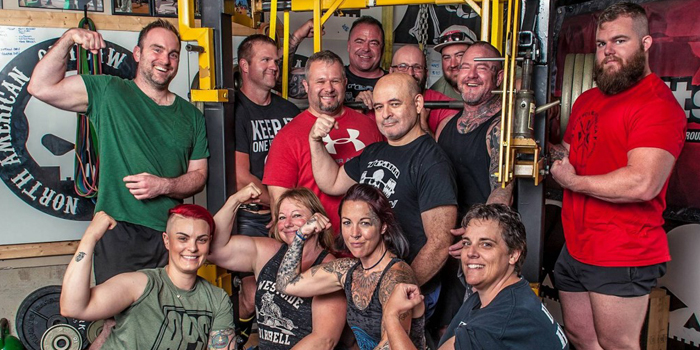
We are extremely fortunate to have a facility and a team of lifters that train together on a regular basis to help each other excel and progress with lifting and competing. How did we start? Ken and I started out as simply us. We started collecting some gym equipment like bars, bands, chains, a squat rack, and more, and created our home gym. It wasn't long until Ken reached out to find a powerlifting gym where we could go train to learn how to lift in gear. Ken discovered a little home gym in Toronto called The Anvil where some of Canada's best lifters trained. It was the home of Clint Harwood, who holds the AWPC bench record at 859 pounds. Ken would drive an hour into Toronto to learn from the people who lifted in gear. Eventually, we started to reciprocate training, and a lot of the local competitors were training at both The Anvil and our Outlaw gym.
RECENT: Why We Powerlift — Getting Inside the Minds of New Lifters
Subsequently, Clint had to move out of Toronto after accepting a job offer elsewhere and The Anvil closed. However, Clint still makes the two-hour drive to train with us on bench training nights. The remaining lifters were welcomed at our gym and we began setting up team training days. Once team members began competing in local meets and doing well, it initiated a lot of interest in more people wanting to come and train at a "powerlifting specific" gym.
Currently, we have about a dozen male and female members who train on a regular basis, and we continuously have people come in to train as guest lifters. We have all the equipment anyone could ever want as a powerlifter: a monolift, belt squat, reverse hyper, GHR, competition bench, lat pulldown, numerous specialty bars, bands, chains, kettlebells, Prowler, sled, and more.
There are no membership or training fees; we supply a top-end training facility for our team for free! Our only requirement to be a member of the team is a commitment to helping other progress and sharing your experience, knowledge, and passion to help every member of the team get better in a positive, encouraging environment. Our Team Outlaw has become our second family. Everyone is very close and sincerely devoted to making us all the best we can be.
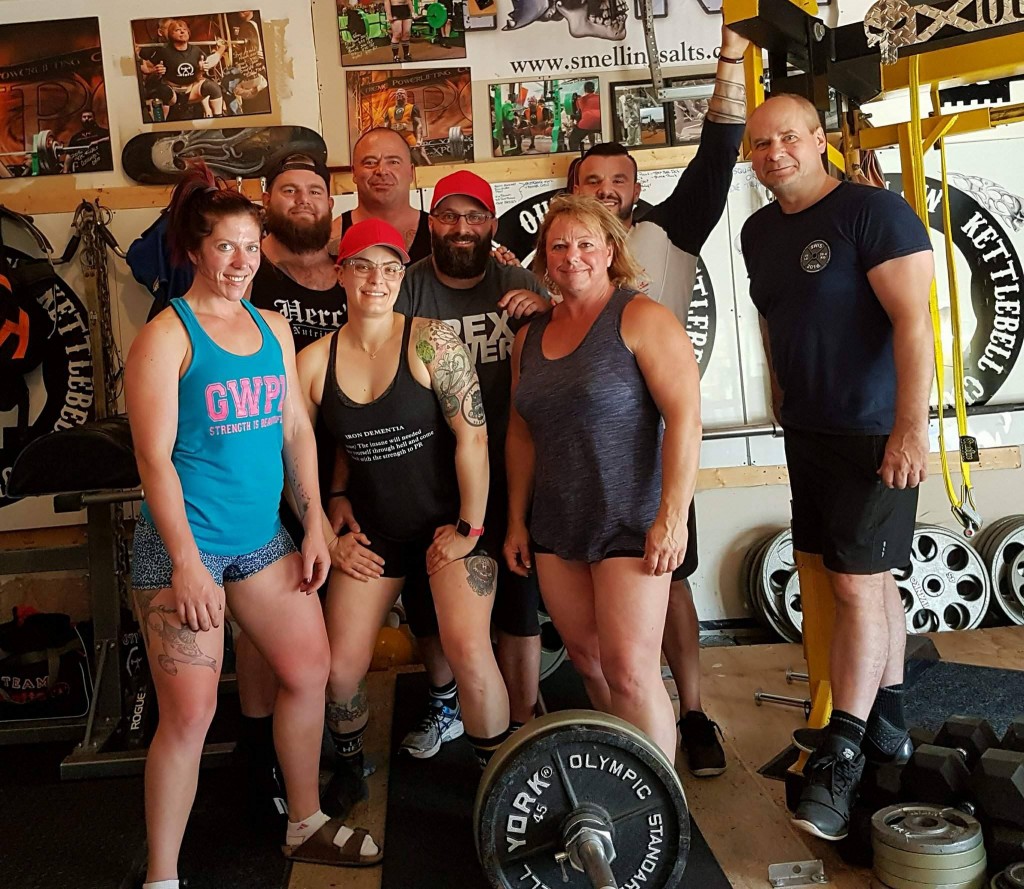
In our team environment, everybody's lifting excelled. Team training days are exciting, with lots of encouragement and positive feedback. When a team member is competing, an emphasis is put on that member's meet prep. We attend the meet as a team, ensuring our team lifter is well-prepared, looked after during warm-ups, and is in the "proper mindset" to be their best that day. A lot of our members have won their respective divisions, set numerous national and world records, and have lifted at some very prestigious events like the Arnold Sports Festival and the WPC World Championships.
What does the word team mean to you? To me this is what a team means:
- Team is a group of people with various complementary skills, working together towards a common vision or goal.
- Team members create synergy with a strong sense of mutual commitment.
- Teams generate performance greater than the sum of the performance of its individual members.
- Teamwork is the fuel that allows common people to attain uncommon results.
- Team members help one another—help other team members—realize their true potential.
- Team members create an environment that allows everyone to go beyond their limitations.
So how does team relate to powerlifting when powerlifting is an individual sport? To some, they may not relate. There are some powerlifters out there that train by themselves and go to meets by themselves, but I would bet dollars to donuts that any successful powerlifter comes from a team of supporters.
For example, you are an equipped lifter and you want to bench press 500 pounds and up. You need a hand-off person, two side spotters, maybe a person to hold a board — and, wow, wouldn’t it be nice if someone could take your video? All of the sudden, there are five people involved in one lift. Same with squats; anyone squatting a substantial amount of weight is probably not walking it out. They are probably using a monolift. So for example, Ken is squatting 900 pounds (yes, because he can). We need a back spotter, two side spotters, someone to run the hooks on the monolift, and of course, you want a video. So that is, again, five people. One of those people will be wrapping knees as well and helping get on the equipment. This is not an individual sport when it comes to the big three lifts with big weights!
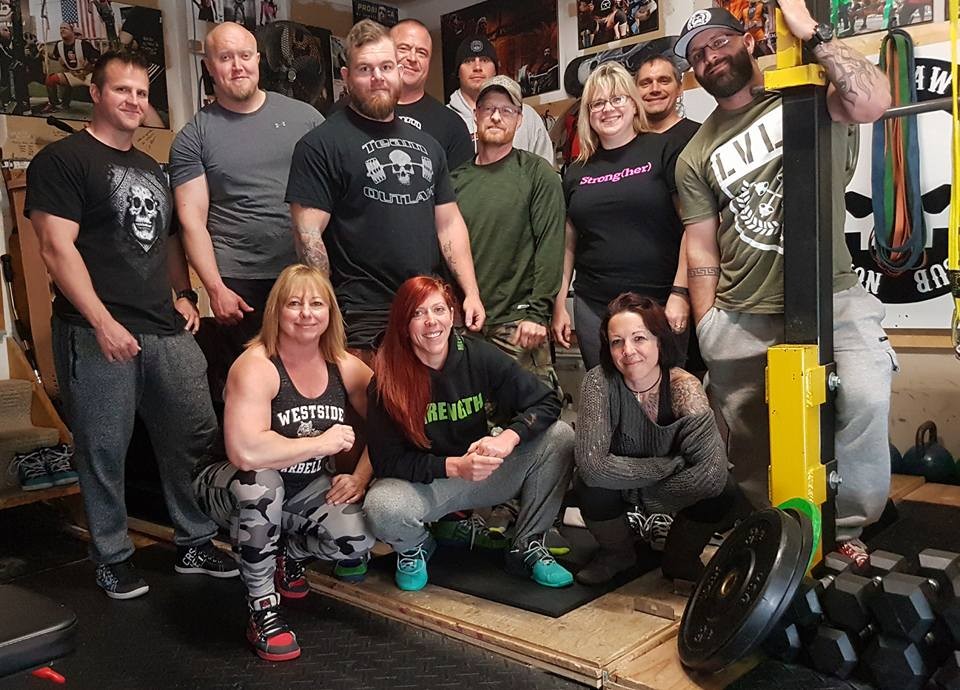
Now let’s talk about the learning aspect of the team environment. If you have created a team with the right people, you will have so many different resources to pull from — people with different strengths and different abilities to point out weaknesses and share how you can improve technique and get better. Dr. Ken Kinakin also trains with our team on a regular basis. We get broken, he fixes us! Our team members consist of world-class powerlifters, powerlifting coaches, personal trainers, gym owners, and the list goes on. With so much knowledge and power in one group of people, how could you not get better?
With being part of a team also comes commitment. You have to be committed to the team and not just yourself. You can’t just show up whenever you feel like it and do your training and go home. It just doesn’t work like that. We all need to share responsibilities, share loading plates, spotting, helping, cleaning up, etc. There's no 'I' in team.
Together
Everyone
Achieves
More
So if you want to be part of something great and are privileged enough to have the opportunity, don’t blow it. Don’t just show up when you feel like it or when you need to train. Show some commitment to the team by showing up every team training session and being there for the team. Don’t make excuses about how busy you are or that you are injured. We are all busy and we have all had injuries. Heck, our team had two members on the injured list for four months, but they still came out to help where they could and did not even train themselves. They even drove over an hour each way to be there. That is commitment at its finest. Don't get me wrong here; we understand sometimes family and work come first because we have that as well.
WATCH: Table Talk — Lessons from Training with John Meadows
So how far would you drive to have the team support to make you a greater lifter? Is 30 minutes too far? An hour? Two hours? Most of our members drive a minimum of an hour to come train. Some drive two, and if you add in traffic they are now two and a half to three hours away. That is commitment. If you are the type of person to only think of yourself, only want to come out and train when you are in meet prep, or think we are too far, then you don’t belong on this team, period.
The best thing about our Outlaw Powerlifting Team is that Ken and I get to decide who is part of our team. We would not try to build a mountain of boulders and use Popsicle sticks. We consider our powerlifting team our second family. We spend a lot of time with them and we trust them. We would not be who we are today without them. Each team member brings something different to the team — that’s the great thing about it!
Ken and I spend a lot of money providing the team the best equipment in the industry and don't charge people to come out and train with us. We need you as much as you need us. Don't forget the reason you are on our team.
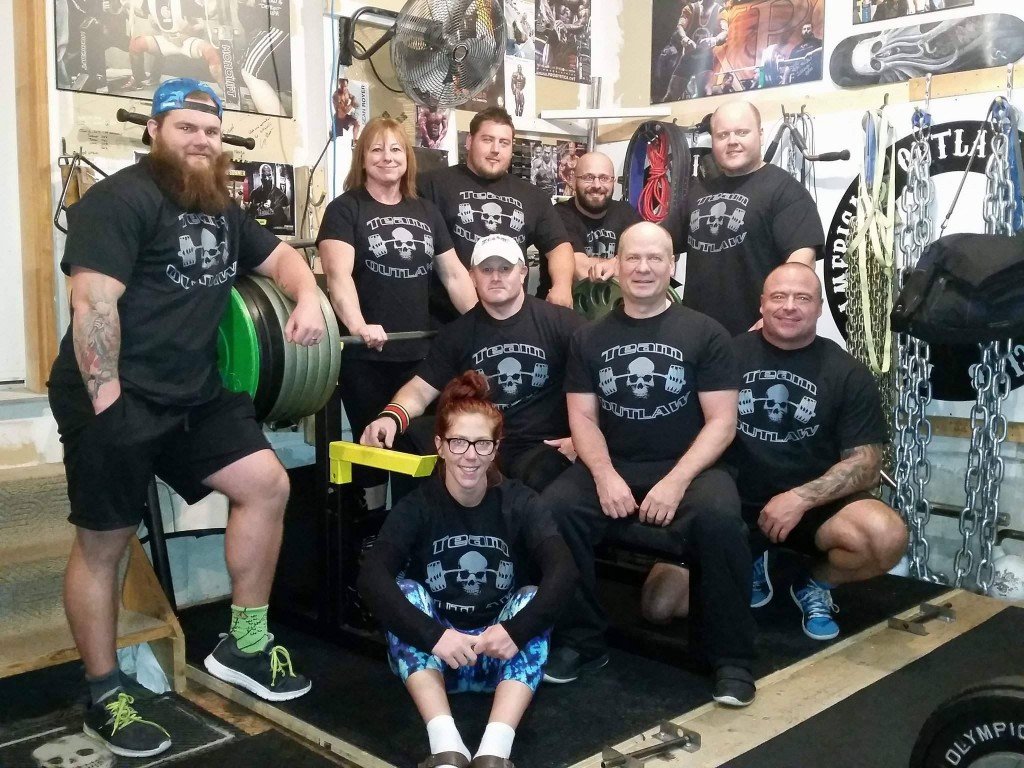
I asked a few of our newest team members to tell me what it has meant for them to be part of Team Outlaw. Here are their responses.
Jamie Don
In powerlifting, which is predominately an individual sport, you must develop a mental fortitude and single-mindedness that will allow you to excel. If you are strong enough, you might just meet some people that can "soften the edges" for you and make it a much more rewarding experience. Several things must be present, however, for this to happen:
- You must have enough self-confidence to be able to submit to another's opinion. Most athletes can be so self-absorbed and used to being coach, critic, judge, and jury that they are unable or unwilling to listen to others' opinions. To be able to listen to others criticism, and discern its constructive components, requires internal strength and belief in one's self.
- You must have an eye for talent. As you are assembling your own team, you must have an eye for those who can complement your own native abilities. Each team member must be able to serve different functions.
If you are lucky, and the circumstances are right, you just may reap some of the benefits of having a great team around you:
- Your team will and should point out things that you can’t or are unwilling to see.
- Your team is going to keep you in check when your ego gets too big.
- Your team is going to pick you up when you get down.
- Your team is going to allow and require you to grow as an athlete as you will be expected to look beyond yourself.
- You will grow as an athlete through helping others with their weaknesses, and through that process be required to confront your own.
I have been fortunate to be in an environment where I can count on a big team of people to lift me to heights that I certainly wouldn’t have attained on my own. My training has gone exceptionally well this off-season. I am particularly grateful for the hospitality you and Ken have extended to me. I have been challenged and supported throughout the summer and improved thanks to you guys. Ken, you have played a huge role in my success. You have encouraged me to work on my weak points and it has paid huge dividends. The Outlaw team has been so welcoming and supportive. It's an amazing environment to grow and train in. Thank you.
Christina Evon
Three years ago I began competing. I was introduced to this whole new world that I knew nothing about. At the beginning, it was intimidating and a bit nerve-racking joining in on team training sessions. Everyone was so strong and here I came in barely being able to bench 95 pounds. But it was those team training sessions that shaped me into the lifter I am now.
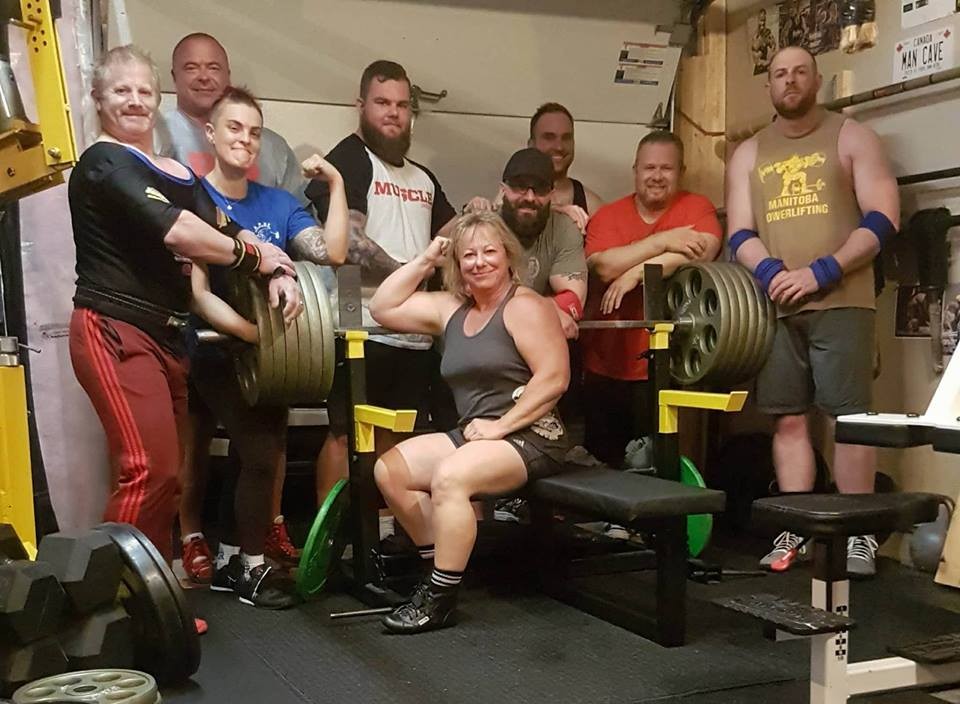
For me, powerlifting has become so much more than an individual sport. Sure, we compete against ourselves to better our numbers—and the ultimate goal is to go nine for nine—but how do we get there? For some people, it’s throwing on headphones and sticking to the plan every day. For others, it’s getting constant motivation from lifting within a team setting. I fall into both categories. It’s unrealistic, at least in my life, to be able to attend every team training session. I often have to be that person who puts on her headphones, follows the plan, and takes videos for others to critique.
When I’m able to attend team training, I love it. I push myself harder, and the motivation and support that I get is incredible. You develop not only a team but a family — a family where it doesn’t matter what skill level you are at, what meet you are prepping for, or what injury you are recovering from. Everyone is there to back you up, to support you, to drive out of their way on days off to watch you compete, and to take time out of their day to help you prep. It's a family that is made up of so much knowledge it’ll make your head spin.
Team training has so many benefits. It has provided me with knowledge and confidence. I’ve been able to watch my “family” members grow both as people and as lifters. It’s a great feeling to be surrounded by people who get it. They get the pain you’re in, or how broken down you feel, or how excited you are, or how pissed off you feel. They get it! Here I am, prepping for the biggest meet of my life thus far, and the amount of support I have behind me is insane, from my coach and husband to my entire family at Outlaw powerlifting. I wouldn’t be where I am today if it weren't for them. I’ve come a long way from the girl who could barely bench 95 pounds! I plan on some big numbers and white lights to come on November 2nd!
Brianna Kane
My attraction to powerlifting was the singularity of the sport. It is just me against the bar: I am responsible for my own gains, I have to make the time for the gym, and I don't have a scheduled obligation to the sport or a team. And with that attitude I began, missing something the whole time. The first day I walked into Ken and Sheri's Outlaw gym, I was so intimidated, full of self-doubt, scared I wouldn't make the cut, and panicked I would embarrass myself and the person that brought me. Strangely enough, not a single thing went wrong. I made all my lifts, I laughed, I may have even cried, my outlook on powerlifting changed, and most importantly I learned and I desperately wanted to go back.
Each and every member of my team is so educated in unique areas, and they are all ready to invest in each other. My team has taken me apart and put me back together, making me a stronger lifter and adding pounds to my lifts. I didn't do that on my own — I did that with my team. That's what I had been missing. I look forward to team lifting days more than anything. Regardless of if I am lifting or loading, I am laughing, learning, and growing.
Having someone in your corner all the time does amazing things for your confidence. It has improved mine and I hope my loud presence has done the same for my teammates. It is so much fun to watch someone succeed for the first time; I may enjoy it more than my own success. As I get closer to my upcoming meet, I have spent a lot of time reflecting on how lucky I am to have such a strong, diverse team of lifters. Although you are solo on that platform, powerlifting is a team sport.
[Meet Update for Brianna: She put 103 pounds on her total while dropping a weight class. She finished with a 220-pound squat, a 145-pound bench, and 260-pound deadlift, going eight for eight. Amazing progress for this girl — Outlaw Strong, strength in numbers.]
Remember what team stands for: together everyone achieves more. Teamwork is less me and more we.
For a preview of some of the team's training, here is our new Team Outlaw YouTube channel.










